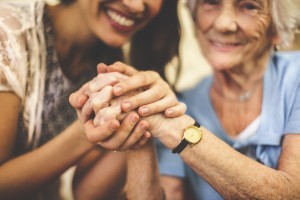Is Paying-It-Forward Good for You?
In a time where nightly news programs feature stories of crime and poverty, the trend toward generosity – to both acquaintances and strangers – is a bright light for many people. These acts of kindness often become hits on the internet and social media as people post photos and share their stories.
What is a random act of kindness?
A random act of kindness, or RAK, is a gift given anonymously to a person, family, or charity by an individual or organization. Random acts of kindness are often done on a small scale, such as  paying for coffee for the next person in line or leaving a small, unexpected gift. However, larger scale gifts, like large tips for waitresses, have recently made headlines.
paying for coffee for the next person in line or leaving a small, unexpected gift. However, larger scale gifts, like large tips for waitresses, have recently made headlines.
Is crowd funding the same thing as a random act of kindness?
Crowd funding is a relatively new concept designed to raise funds for a family or project through the use of the internet and social media. Oftentimes crowd funding is used to offset the costs of medical bills or unexpected funeral costs for families struck by tragedy. These donations can typically be made by credit card or PayPal and some may qualify as a tax write-off.
Do gifts have to be monetary?
Many non-profit organizations are in need of volunteers for cleaning, serving meals, and providing care to adults, children, and animals. In addition, some charities may request donations in the form of clothing, small appliances, and household goods. These items are used by the charity or sold to raise funds.
Can money buy happiness?
There is no question how the recipient of the gift feels – joy, relief, gratitude. However, are there similar benefits to the giver of the gift?
In 2008, Science magazine published a study done by Michael Norton, a professor at Harvard. Norton interviewed 632 Americans to study their income, giving practices and the impact on their happiness. The study showed a direct correlation between the amount the individuals gave to charities and their happiness, regardless of income. The study also showed the amount of the gift was irrelevant – donations as small as $5 resulted in an increased level of happiness for the giver.
In addition to emotional health, many medical institutions believe happiness has a direct impact on physical health as well. According to a 2007 study conducted by Laura Kubansky, a professor at Harvard School of Public Health, optimism and happiness reduced the occurrence of heart disease by approximately 50 percent. Kubansky’s study also showed that happy, positive 7-year-old children reported better overall health in the following 30 years.
As Winston Churchill said, “We make a living by what we get. We make a life by what we give.”
Give back this holiday season, you may not believe the impact it can have on your overall health and wellness.
Sources
“Spending Money on Others Promotes Happiness,” Michael Norton, Elizabeth Dunn, Lara Aknin (2008) –https://www.sciencemag.org/content/319/5870/1687.short




